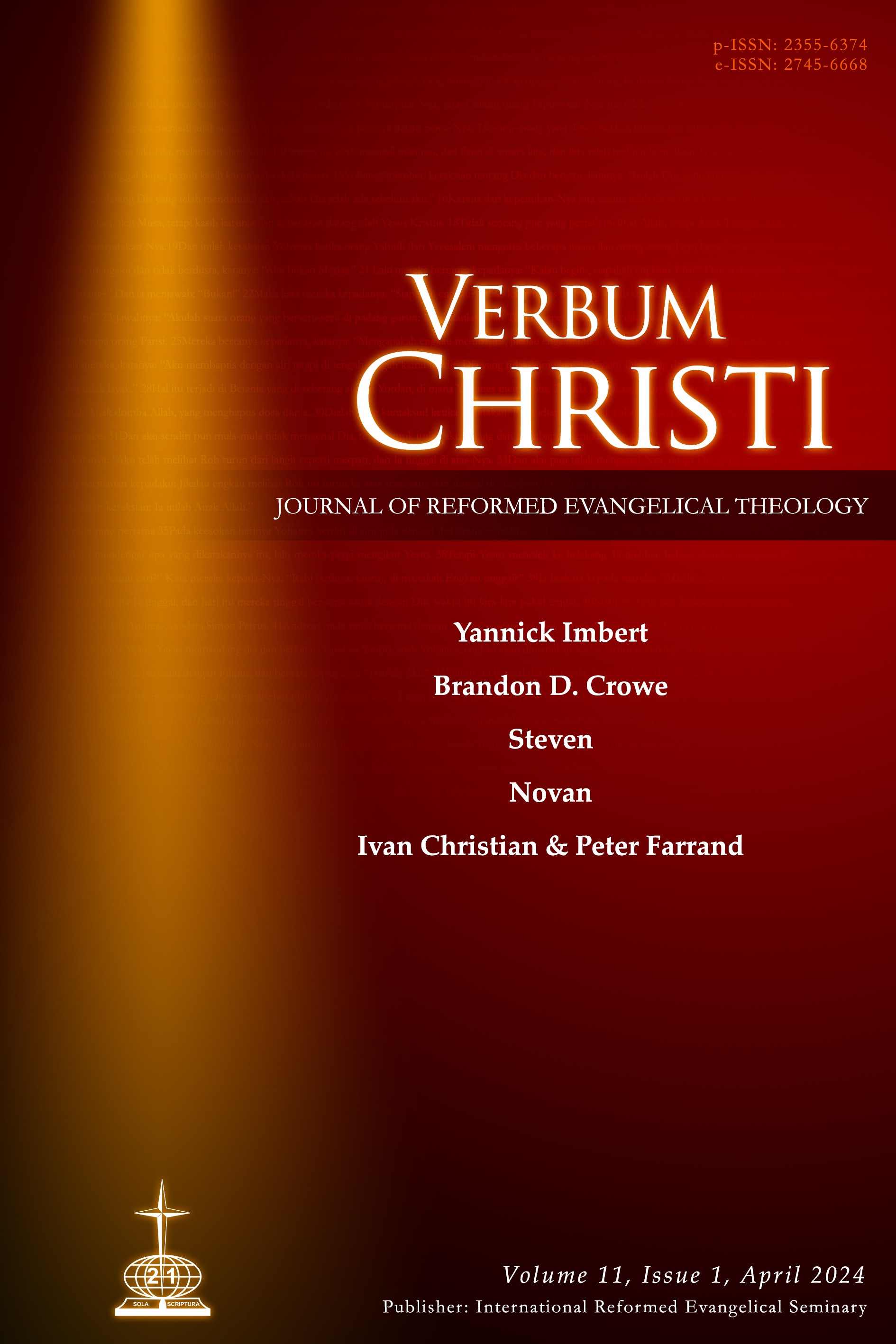“But Saul Held His Peace"
A Lexical-Syntactical Analysis of 1 Samuel 10:27
DOI:
https://doi.org/10.51688/VC11.1.2024.art3Keywords:
1 Samuel 10, textual criticism, lexical-syntactical analysis, exegesisAbstract
A problem raised in the text of 1 Samuel 10:27, since the word כמחריש in Masoretic Text is conspicous both in terms of the text transmission as well as in the level of exegesis. In the context of the narrative, after appointing Saul as the first king of Israel, some of the people seem to question Saul’s credibility. This leads to harsh comment on the new king. Interestingly, some interpretations seem to portray a kind of Saul’s response to the comment in 1 Samuel 10:27, while others completely silence. This article will come with a suggestion to the passage by imploring textual criticism, deciding the possibly fitting word for כמחריש, considering its larger narrative context, and then doing lexical-syntactical analysis to the passage. This article contends that the correction made by the LXX that supported by the DSS and Josephus’ writing is closer to the original.
Downloads
References
Balfour, Rory J. “Rejection Realized: Saul, the Evil Spirit and the Loss of Kingship,” Journal for the Study of the Old Testament, 47, no. 2 (2022): 206–22. https://doi.org/10.1177/03090892221116918.
Botterweck, G. Johannes, and Ringgren, eds. “חרש.” In Theological Dictionary of the Old Testament. Vol. 5. Grand Rapids: William B. Eerdmans, 1986.
Campbell, Antony F. 1 Samuel. Vol. 7. The Forms of the Old Testament Literature. Grand Rapids: William B. Eerdmans, 2003.
Cappel, Louis. Critica Sacra. Paris: Cramoisy, 1650.
Condrea, Vasile. A Text-Linguistic Reading of 1 Samuel. Syntactic Studies in Targum Aramaic. New Jersey: Georgias Press, 2020.
Cross, Frank Moore. “The Ammonite Oppression of the Tribes of Gad and Reuben: Missing Verses from 1 Samuel 11 Found in 4QSamuela.” In History, Historiography and Interpretation. Studies in Biblical and Cuneiform Literatures. Jerusalem: Magnes, 1983.
Cross, Frank Moore, Donald W. Parry, Richard J. Saley, and Eugene Ulrich. Qumran Cave 4.XII: 1-2 Samuel. Discoveries in the Judaean Desert XVII. Oxford: Clarendon Press, 2005.
Decker, Aaron J. “Multivalent Readings of Multivalent Texts: 1 Samuel 10:27 and the Problem of Textual Variants in the Interpretation of Scripture,” Currents in Theology and Mission, 41, no. 6 (2014): 412–16.
Diehl, Johannes Friedrich, and Markus Witte, eds. “חרש.” In Hebräisches Und Aramäisches Wörterbuch Zum Alten Testament. Berlin: De Gruyter, 2021.
Elliger, Karl, and Willhelm Rudolph, eds. Biblia Hebraica Stuttgartensia. Stuttgart: Deutsche Bibelgesellschaft, 1997.
Glover, Daniel B. “Is Josephus Among the Qumranites?: Unraveling a Textual Conondrum in 1 Samuel 10:27,” Zeitschrift für die alttestamentliche Wissenschaft, 132, no. 2 (2020): 266–80. https://doi.org/10.1515/zaw-2020-2005.
Gordon, C. H. The Common Background of Greek and Hebrew Civilizations. New York: W. W. Norton, 1965.
Herbert, Edward D. “4QSama and Its Relationship to the LXX: An Exploration in Stemmatological Analysis.” In IX Congress of the International Organization for Septuagint and Cognate Studies, edited by Bernard A. Taylor. Atlanta: Scholars Press, 1995.
Hwang, Jerry. “Yahweh’s Poetic Mishpat in Israel’s Kingship: A Reassessment of 1 Samuel 8-12,” Westminster Theological Journal, 73, no. 2 (2011): 341–61.
Jenni, Ernst, and Claus Westermann, eds. “חרש.” In Theologisches Handwörterbuch Zum Alten Testament. Vol. 1. München: Theologischer Verlag Zürich, 1976 1971.
Josephus. Jewish Antiquities Books V-VIII. Translated by Henry St. John Thackeray and Ralph Marcus. Vol. 5. Cambridge: Harvard University Press, 1950.
Keil, C. F., and Franz Delitzsch. Commentary on 1 Chronicles. Grand Rapids: William B. Eerdmans, 1949.
Klein, Ralph W. 1 Samuel. Vol. 10. Word Biblical Commentary. Grand Rapids: Zondervan, 2000.
Ming, D. “Reflection on the Leadership Practice of Saul as a Failure of Leadership for Church Pastors,” Acta Theologica, 42, no. 2 (2022): 294–310. http://dx.doi.org/10.18820/23099089/actat.v42i2.19.
Rahlfs, Alfred, and Robert Hanhart, eds. Septuaginta: Id Est Vetus Testamentum Graece Iuxta LXX Interpretes. Stuttgart: Deutsche Bibelgesellschaft, 2006.
Rofé, Alexander. “The Acts of Nahash According to 4QSama.” Israel Exploration Journal 32, no. 2 (1982): 129–33.
Stuart, Douglas. Old Testament Exegesis: A Handbook for Students and Pastors. Louisville: Westminster John Knox Press, 2009.
Suharto, Daniel, Muner Daliman, and Yonathan Salmon Efrayim Ngesthi. “Persistent Leadership: Constructive Reflections on Saul’s Leadership Model,” Pharos Journal of Theology, 104, no. 1 (2023): 1–10. https://doi.org/10.46222/pharosjot.10424.
Tov, Emanuel. The Text-Critical Use of the Septuagint in Biblical Research. 3rd ed. Winona Lake, Indiana: Eisenbrauns, 2015.
Tsumura, David Toshio. The First Book of Samuel. The New International Commentary on the Old Testament. Grand Rapids: William B. Eerdmans, 2007.
Ulrich, Eugene. The Qumran Text of Samuel and Josephus. Vol. 19. Harvard Semitic Monographs. Missoula: Scholars Press, 1978.
Downloads
Published
How to Cite
Issue
Section
License
This article follows the terms of Creative Commons Attribution-NonCommercial 4.0 International License.
Copyright (c) 2024 Verbum Christi: Journal of Reformed Evangelical Theology. It is held by the journal with the author's consent.




